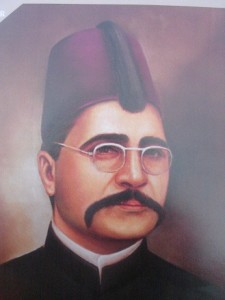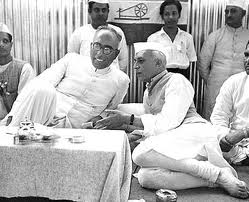Peace Watch » Editor's Take, Kashmir-Talk, Point of view » Kashmir Scholars: Revisit The Past And Tell The Untold Story
Kashmir Scholars: Revisit The Past And Tell The Untold Story
PUNCHLINE
Scholars Must Revisit
By
Z.G. Muhammad
 Some friends, are opposed to the idea of relating the history of the land, old or of the recent past to the current ‘dominant discourse’ or the contemporary ‘people’s narrative’. They have the right to do so; everyone has the right to hold an opinion. Nonetheless, to quote Frederick Douglass, a nineteenth-century American social reformer and leader to end slavery in America. ‘It is essential to keep a record of our history no matter how horrible things are, by remembering the past, we might have the wisdom not to make the same mistakes in the future. Moreover, they offer the oppressed the ability to speak for themselves.’
Some friends, are opposed to the idea of relating the history of the land, old or of the recent past to the current ‘dominant discourse’ or the contemporary ‘people’s narrative’. They have the right to do so; everyone has the right to hold an opinion. Nonetheless, to quote Frederick Douglass, a nineteenth-century American social reformer and leader to end slavery in America. ‘It is essential to keep a record of our history no matter how horrible things are, by remembering the past, we might have the wisdom not to make the same mistakes in the future. Moreover, they offer the oppressed the ability to speak for themselves.’
To be honest notwithstanding claiming to be an intelligent race, we have failed to do anything highlighted in the above quote to keep our narrative alive and draw wisdom from the past mistakes – in reality; we are caught in the morass of past errors to this day. Sadly, many of our chroniclers instead of identifying these mistakes indulging in worst kind of hagiography have glorified them, and many others unwittingly have perpetuated them. Of late, there have been some glad tidings, with some young and old scholars piecing together some realities and demolishing the hagiographic accounts bordering myths and demystifying some faintly visible facts with the publication of their works about the situations then obtaining and decisions taken by the leadership at the critical junctures in our history.
That for telling the whole truth to the generation- next to the contemporary historiographers, research scholars and writers need to unburden themselves of the past hagiographic accounts, and the ‘dominant discourse’ and revisit the past for removing the distortions in our resistance narrative. It dawned on me while working on a small paper on the genesis of the Kashmir Dispute and perpetuation of the political uncertainty in the state. Most of the writers and leaders, across the political divide, see political developments in the sub-continent after British sailed across the Indian ocean lock, stock and barrel as the primary cause for the birth of the Kashmir Dispute and future of the state hanging fire. Some attribute it to dithering Maharaja Hari Singh, failing to join either of the two dominions – India and Pakistan. Some, blame the Afradies and other tribals from the Frontier Province supposed to be supported by Pakistan, invading the state for joining the Poonch rebellions. Some attribute, the perpetuation of uncertainty to the first Prime Minister of India, Jawaharlal Nehru taking the question of future of Jammu and Kashmir to the United Nations Security. Nehru had bolstered the criticism against him by his critics in pronouncing his action was a faux pas and trying to retrace his steps through hideous tactics of backing out from his commitment for a plebiscite in Jammu and Kashmir.
These factors might have contributed to the uncertainty, but historically the question over the genesis of the future of Jammu and Kashmir started much earlier to the division of British India. Instead, of recognising, the struggle initiated by the eighty-two per cent population of the state in 1924 that graduated to full-scale movement after the massacre unarmed Muslims on 13 July 1931 was projected as a battle of ideologies- pan-Islamism vs nationalism. Pandit Prem Nath Bazaz, who after a couple of years was a friend, philosopher and guide of Sheikh Mohammad Abdullah one of the protagonist of the Jammu and Kashmir Muslim Conference was in the frontline of this disinformation campaign against the movement started by the Muslims of the state for equal rights, and opportunities discriminated against for their faith.
 Dr Sir Mohammad Iqbal’s was the inspiration for the entire spectrum of the Muslim Conference leadership and backbone of the movement in as much as mobilising people in British India in support of underprivileged citizen of Jammu and Kashmir. He along with other prominent Muslim leaders in Punjab and other parts of India had set up All India Kashmir Committee, in Lahore, for supporting the Kashmir movement. Iqbal and the Kashmir Committee had become an eyesore for a minuscule privileged, and a pampered section of the Kashmir society and Bazaz as a leader of this section sent inflated and also baseless reports to the Indian National Congress leaders- using pan-Islamism as Brim-Brim-Chowk (scare phantom). In response to Bazaz’s sounding the false arm about the existential threat to his community the Indian National Congress deputed its leaders Sir Taj Bhaudar Saproo, Colonel Haksar and Abul Kalam Azad to Kashmir, ostensibly two of them were here to guide the Maharaja on the Indian Federal Scheme. Saproo and Haksar, would not have been in Kashmir without the approval of the Congress leadership. Sending regular reports, Bazaz apprised and also alarmed the Indian Congress leadership more particularly Gandhi and Nehru about the situation in Kashmir. The July 1932 meeting between him and Sheikh Abdullah, was not held on share initiative of Bazaz but at the behest of Nehru.
Dr Sir Mohammad Iqbal’s was the inspiration for the entire spectrum of the Muslim Conference leadership and backbone of the movement in as much as mobilising people in British India in support of underprivileged citizen of Jammu and Kashmir. He along with other prominent Muslim leaders in Punjab and other parts of India had set up All India Kashmir Committee, in Lahore, for supporting the Kashmir movement. Iqbal and the Kashmir Committee had become an eyesore for a minuscule privileged, and a pampered section of the Kashmir society and Bazaz as a leader of this section sent inflated and also baseless reports to the Indian National Congress leaders- using pan-Islamism as Brim-Brim-Chowk (scare phantom). In response to Bazaz’s sounding the false arm about the existential threat to his community the Indian National Congress deputed its leaders Sir Taj Bhaudar Saproo, Colonel Haksar and Abul Kalam Azad to Kashmir, ostensibly two of them were here to guide the Maharaja on the Indian Federal Scheme. Saproo and Haksar, would not have been in Kashmir without the approval of the Congress leadership. Sending regular reports, Bazaz apprised and also alarmed the Indian Congress leadership more particularly Gandhi and Nehru about the situation in Kashmir. The July 1932 meeting between him and Sheikh Abdullah, was not held on share initiative of Bazaz but at the behest of Nehru. 
Nevertheless, despite the Indian National Congress operating through its proxies, to the frustration of Bazaz, it could no counterbalance the influence of Allama Iqbal on the movement. In a long letter to Gandhi, he wrote:
“The present movement among Muslims is headed by disgruntled and dissatisfied youths. These educated Muslims began to think and conspire. Some are anxious tools in the hands of Pan-Islamic leaders of Punjab like Sir Mohammad Iqbal and others. They see the dream of wiping out Hindus from Kashmir and establishing a Mohammedans confederacy in Northern India, and others who were always anxious to meddle in political affairs of Kashmir have now found an opportunity of fulfilling their long-cherished schemes of pan-Islamism.”
Not happy with answerer of Gandhi that Kashmir was bound to become one day a Muslim State. Bazaz, wrote a long letter to Nehru to know about the future destination of Kashmir enclosing reply received from Gandhi. Thus, initiated the first time, the debate over future of Jammu and Kashmir- about four years before the Muslim Leauge adopted the Lahore Resolution, later on, called as ‘Pakistan Resolution. Nehru in his long letter informed him how the Indian National Congress was looking at future of Kashmir:
“It is clear that ultimate fate of Kashmir, as of the other Indian States, is bound up with the idea of India as a whole. So that the great struggle of Indian independence governs the situation and more or less local struggle in Kashmir must be viewed in the light of Indian struggle.”
 Nehru did not stop only at assuring Bazaz about the future Kashmir. Nonetheless, to see the ultimate fate of Kashmir in joining India, he immediately after sending a team of the Congress leaders to Srinagar headed by Purshottam Das Tandon to meet Sheikh Abdullah and Prem Nath Bazaz’. Then he sent two prominent Congress leaders, Khan Abdul Gaffar Khan and Dr K. M. Ashraf a Marxist historian, a leading a member of the All-India Congress Committee (AICC) to establish mass contact. K. M. Ashraf, on the direction of Nehru, stayed back in Srinagar and held meetings with a section of the Muslim Conference. After that, we see the Indian National Congress leadership virtually taking over the movement and succeeding in dividing the Muslim leadership and moreover using the division in the leadership translating Nehru’s idea into reality. The idea failed to be a reality but fractured the state and pushed the country into a whirlpool of carmine uncertainty.
Nehru did not stop only at assuring Bazaz about the future Kashmir. Nonetheless, to see the ultimate fate of Kashmir in joining India, he immediately after sending a team of the Congress leaders to Srinagar headed by Purshottam Das Tandon to meet Sheikh Abdullah and Prem Nath Bazaz’. Then he sent two prominent Congress leaders, Khan Abdul Gaffar Khan and Dr K. M. Ashraf a Marxist historian, a leading a member of the All-India Congress Committee (AICC) to establish mass contact. K. M. Ashraf, on the direction of Nehru, stayed back in Srinagar and held meetings with a section of the Muslim Conference. After that, we see the Indian National Congress leadership virtually taking over the movement and succeeding in dividing the Muslim leadership and moreover using the division in the leadership translating Nehru’s idea into reality. The idea failed to be a reality but fractured the state and pushed the country into a whirlpool of carmine uncertainty.
Nevertheless, the question raised by Bazaz in the thirties and answered by Nehru remains to this day unanswered.
Filed under: Editor's Take, Kashmir-Talk, Point of view







